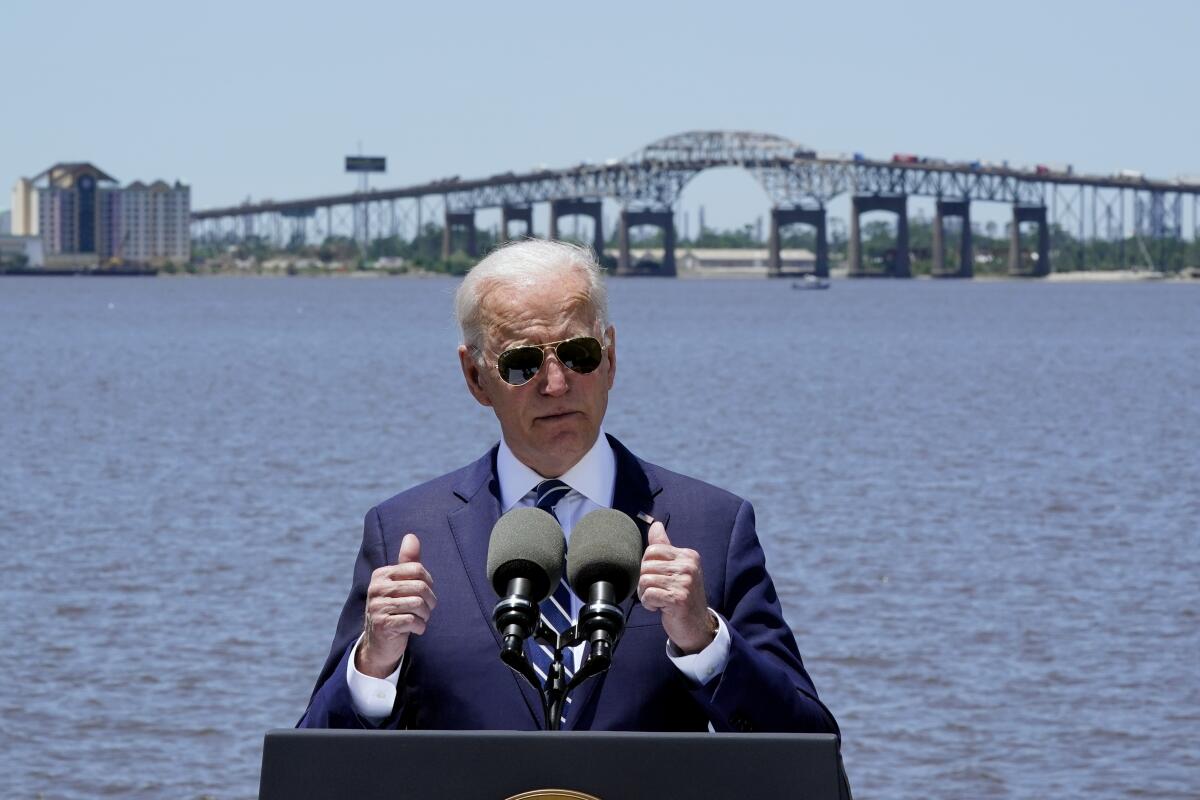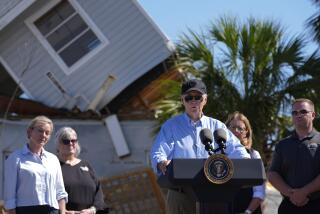Biden makes rare trip to red state for infrastructure pitch in Louisiana

- Share via
LAKE CHARLES, La. — President Biden made his first stop in a red state to pitch his multitrillion-dollar infrastructure and jobs proposal Thursday, stumping in Louisiana as he seeks to redefine more broadly what it means to win bipartisan support.
With congressional Republicans largely united against his plans, Biden is reaching beyond them to voters for backing. He first went to Lake Charles, in the state’s southwest corner, where he spoke near the aged, overburdened Calcasieu River Bridge.
“I’ve never seen a Republican or a Democratic road. I just see roads,” Biden said. He added, with a dig at his predecessor’s repeated unfulfilled promises to fix public works like the bridge at Lake Charles, “I got so tired of hearing ‘Infrastructure Week.’ Nothing happened.”
Next Biden headed to New Orleans to talk about federal investments in water projects — a potentially popular idea in a coastal state increasingly threatened with inundation spurred by climate change. He was met at the airport by a number of elected officials, including Louisiana’s two U.S. senators, both Republicans.
A reminder of the area’s problem arrived a day before Biden’s visit: Heavy rains led to flash flood warnings in New Orleans. The president planned to tour one of the city’s aging, troubled facilities that houses water purification equipment and turbines for drainage pumps. Administration officials estimate that fixing Louisiana’s water infrastructure would cost $7 billion over two decades.
Despite the lack of support from elected Republicans, Biden’s plans are broadly popular with the public. Two out of three Americans support the infrastructure proposal, according to polls released by Monmouth University and the New York Times last month. However, only one-third of Republicans in those polls backed the plans.
Senate Minority Leader Mitch McConnell (R-Ky.) signaled Wednesday that he would dig in his heels in Congress. “One hundred percent of my focus is on stopping this new administration,” he said during an event in his home state.
Biden brushed off the comment when reporters at the White House asked about it, recalling, “I was able to get a lot done with him” after McConnell said something similar when former President Obama was in office and Biden was vice president.
“I’m willing to compromise,” Biden said, but “I’m not willing to deficit-spend.” He blamed Republicans for putting the nation “$2 trillion in the hole” with tax cuts that disproportionately benefited the wealthy and didn’t produce the promised economic growth to offset the loss in revenue.
In traveling to Louisiana to make his case, Biden was in a place that has been a Republican stronghold in presidential and recent Senate elections. But the state has a Democratic governor, John Bel Edwards, who welcomed Biden to Lake Charles.
“We have billions of dollars in backlogged infrastructure projects in Louisiana, and I am thankful for federal support to tackle these challenges, create jobs and improve life for our people,” Edwards tweeted before Biden’s visit.
Brian Brox, a political science professor at Tulane University in New Orleans, said Biden’s pitch could receive a tepid response, particularly in Lake Charles, which is home to refineries, pipelines and petrochemical plants. Biden has pledged that the transition to clean energy to combat climate change will generate new jobs, but doubters abound in such areas, where the oil and gas industry remains what Brox called “a way of life.”
“It’s not terribly persuasive,” he said. “These are people who are very rooted to the existing economic arrangements.”
Congressional Republicans have lined up to oppose Biden’s proposed $2.25 trillion in spending over a decade, due to its cost and because it would be paid for with higher taxes on corporations and the wealthy. Some in the GOP have offered a far smaller package focused on roads, bridges, broadband access and drinking water improvements. They put the cost at $568 billion, but much of that reflects money already projected for such expenditures, while Biden is calling for new funding.
Sen. Shelley Moore Capito (R-W.Va.), who is playing a key role in negotiations with the White House, recently said she had a “constructive” conversation with Biden in which they “expressed our mutual desire to work together.”
Biden visited Texas after a deadly storm, and he went to Ohio to mark the 10th anniversary of the Affordable Care Act. But most of his travels have been to swing states like Georgia and Pennsylvania, where he beat former President Trump.
More to Read
Get the L.A. Times Politics newsletter
Deeply reported insights into legislation, politics and policy from Sacramento, Washington and beyond. In your inbox three times per week.
You may occasionally receive promotional content from the Los Angeles Times.











